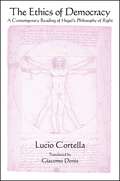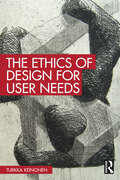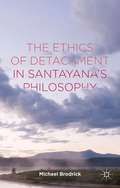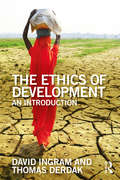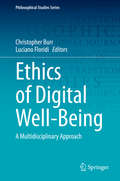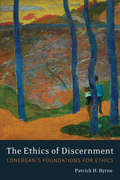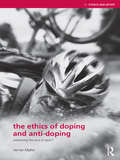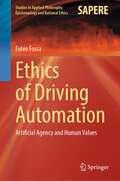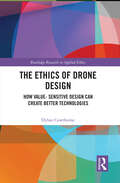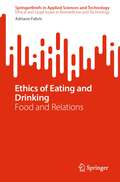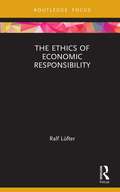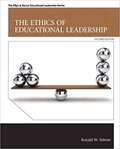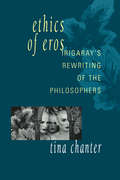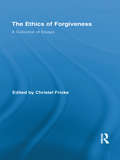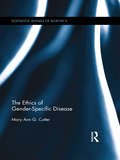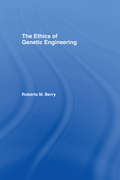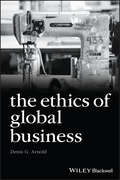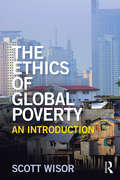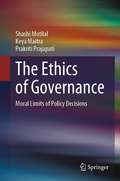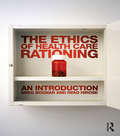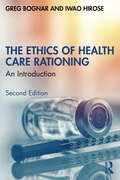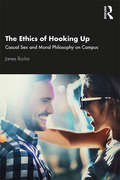- Table View
- List View
The Ethics of Democracy: A Contemporary Reading of Hegel's Philosophy of Right (SUNY series in Contemporary Italian Philosophy)
by Lucio CortellaThe legal regulations and formal rules of democracy alone are not enough to hold a society together and govern its processes. Yet the irreducible ethical pluralism that characterizes contemporary society seems to make it impossible to impose a single system of values as a source of social cohesion and identity reference. In this book, Lucio Cortella argues that Hegel's theory of ethical life can provide such a grounding and makes the case through an analysis of Hegel's central political work, the Philosophy of Right. Although Hegel did not support democratic political ends and wrote in a historical and cultural context far removed from the current liberal-democratic scene, Cortella maintains that the Hegelian theory of ethical life, with its emphasis on securing a framework conducive to human freedom, nevertheless offers a convincing response to the problem of the ethical uprootedness of contemporary democracy.
The Ethics of Design for User Needs
by Turkka KeinonenThis book offers an inquiry into the ethics of ‘human needs capture’ for design purposes by drawing upon ethical theories and narratives. Designers have historically relied upon the satisfaction of human needs as a moral justification for their profession. This volume offers an alternative critique to challenge this perspective, arguing that seeking to satisfy needs doesn't offer sufficient moral justification on its own. It presents an extensive ethical analysis of the notion of need and develops a thought-provoking case for a plural reconceptualisation of the notion of ‘need’ as user-based knowledge about product and service improvement opportunities. It does this by drawing upon a range of ethical approaches including Soran Reader’s needs ethics, classical utilitarianism, Robert Nozick’s libertarian philosophy, and John Rawls’ theory of justice. The book goes on to link these approaches to concepts guiding design such as human-centred design, collaborative design, and end user innovation. Written as a dialogue between a designer and his consciousness, the book underlines the deliberative nature of applied design ethics, and also highlights how consciousness challenges designers to solve their moral dilemmas. This engaging format invites readers to become an intimate part of the ‘discussion’. This book will be of interest to students and academics studying product design, industrial design, interaction design, user experience design, design ethics, and sustainable development.
The Ethics of Detachment in Santayana’s Philosophy
by Michael BrodrickGerman philosopher Arthur Schopenhauer wrote in 1818 that true happiness is impossible without inner peace. Around a hundred years later, after studying Schopenhauer, American philosopher George Santayana explained in detail how we can achieve inner peace through a special activity he called 'spirituality'. While Santayana's theory of spirituality is not well known today, it holds great promise for improving our lives. A form of momentary detachment from ideals and values, spirituality frees us to enjoy what there is, without judging it. Brodrick clarifies and completes Santayana's account of spirituality, while suggesting how spirituality can relieve human suffering, enrich our daily lives, and even make us better human beings. The finitude of the world and our own finitude mean that nothing in this life will ever be perfect, but spirituality reveals that, in a sense, everything is good enough as it is.
The Ethics of Development: An Introduction (The Ethics of ...)
by David Ingram Thomas J DerdakThe Ethics of Development: An Introduction systematically and comprehensively examines the ethical issues surrounding the concept of development. The book addresses important questions such as: What does development mean? Is there a human right to development? If we aim for sustainable development in an age of global climate change, should developed nations sacrifice economic growth for the sake of allowing developing countries to catch up? Should eradication of poverty or diminution of radical inequality be the principal focus of developmental policy? What are the macroeconomic theories of development? And how have they informed development policy? How does development work in practice? Featuring case studies throughout, this textbook provides a philosophical introduction to an incredibly topical issue studied by students within the fields of applied ethics, global justice, economics, politics, sociology, and public policy.
Ethics of Digital Well-Being: A Multidisciplinary Approach (Philosophical Studies Series #140)
by Luciano Floridi Christopher BurrThis book brings together international experts from a wide variety of disciplines, in order to understand the impact that digital technologies have had on our well-being as well as our understanding of what it means to live a life that is good for us. The multidisciplinary perspective that this collection offers demonstrates the breadth and importance of these discussions, and represents a pivotal and state-of-the-art contribution to the ongoing discussion concerning digital well-being. Furthermore, this is the first book that captures the complex set of issues that are implicated by the ongoing development of digital technologies, impacting our well-being either directly or indirectly. By helping to clarify some of the most pertinent issues, this collection clarifies the risks and opportunities associated with deploying digital technologies in various social domains.Chapter 2 is available open access under a Creative Commons Attribution 4.0 International License via link.springer.com.
The Ethics of Discernment
by Patrick H. ByrneIn The Ethics of Discernment, Patrick H. Byrne presents an approach to ethics that builds upon the cognitional theory and the philosophical method of self-appropriation that Bernard Lonergan introduced in his book Insight, as well as upon Lonergan's later writing on ethics and values.Extending Lonergan's method into the realm of ethics, Byrne argues that we can use self-appropriation to come to objective judgements of value. The Ethics of Discernment is an introspective analysis of that process, in which sustained ethical inquiry and attentiveness to feelings as "intentions of value" leads to a rich conception of the good.Written both for those with an interest in Lonergan's philosophy and for those interested in theories of ethics who have only a limited knowledge of Lonergan's work, Byrne's book is the first detailed exposition of an ethical theory based on Lonergan's philosophical method.
The Ethics of Doping and Anti-Doping: Redeeming the Soul of Sport? (Ethics and Sport)
by Verner MøllerWith every positive drugs test the credibility and veracity of modern elite sport is diminished. In this radical and provocative critique of current anti-doping policy and practice, Verner Møller argues that the fight against doping – promoted as an initiative to cleanse sport of cheats – is at heart nothing less than a battle to save sport from itself, located on the fault-line between the will to purity and the will to win. Drawing on extensive and detailed case studies of doping in sport, and using a highly original blend of conceptual ideas from philosophy and sociology, Møller strongly criticises current anti-doping regimes and challenges our commonly held ideas about the nature of sport and the risks posed by drugs to health and fair play. He argues forcefully that we must understand the precarious position of the athlete and that only by containing coaches, doctors and drug companies within the anti-doping regime can we hope to ever make progress on this most important issue. Written in a lively and engaging style, and skilfully blending empirical case studies with cutting edge theory, this book represents an important statement on the nature of sport, morality and modernity. It is important reading for all serious students and scholars of the ethics, sociology and politics of sport.
Ethics of Driving Automation: Artificial Agency and Human Values (Studies in Applied Philosophy, Epistemology and Rational Ethics #65)
by Fabio FossaThis book offers a systematic and thorough philosophical analysis of the ways in which driving automation crosses path with ethical values. Upon introducing the different forms of driving automation and examining their relation to human autonomy, it provides readers with in-depth reflections on safety, privacy, moral judgment, control, responsibility, sustainability, and other ethical issues. Driving is undoubtedly a moral activity as a human act. Transferring it to artificial agents such as connected and automated vehicles necessarily raises many philosophical questions. When driving is automated, what happens to its ethical dimensions? Could artificial agents accomplish ethical objectives on our behalf, take moral decisions in our place, and drive us into a more ethical transportation future? In doing so, would they be “moral” as we are or in a way that is similar to, but also remarkably different from, our own? And what role is yet to be played by human responsibility and commitment? The book addresses these questions with the aim of stimulating an interdisciplinary dialogue between different stakeholders. They include automotive engineers, computer scientists, and moral philosophers, as well as industry representatives, policymakers, regulators, transportation experts, and the general public. Indeed, connected and automated vehicles will not take the high road for us . We must drive them there.
The Ethics of Drone Design: How Value-Sensitive Design Can Create Better Technologies (Routledge Research in Applied Ethics)
by Dylan CawthorneThis book presents a holistic approach to the design and use of drones. It argues that this powerful technology requires high levels of ethical analysis and responsibility – our moral progress must keep pace with our technological progress. Drone technologies support and diminish the flourishing of certain human values, impact power relations between individuals and groups, and add an additional element to the complex network of humans and objects in modern society. The book begins by introducing four prototype drones designed and built by the author: the healthcare drone, the search and rescue drone, the educational drone, and the spiritual drone. These drones have been developed using a value-sensitive design approach – with values such as human welfare, privacy, trust, environmental sustainability, and justice at the forefront. Ethical analyses and social impacts are taken as design inputs, leading to the creation of better, more responsible drone designs. The book then showcases additional methods used to develop the prototype drones from the fields of engineering, ethics, and art, including ethical frameworks, ethics standards, capability caution, and speculative design. The holistic approach reveals a more subtle and nuanced view of drones than the currently polarized characterization of "the good drone" or "the killer drone". The book concludes with recommendations for drone engineers, companies, lawmakers, and citizens on how to support ethics in drone design. The Ethics of Drone Design is an essential resource for scholars, advanced students, engineers, and designers interested in the ethics of technology.
The Ethics of Drone Design: How Value-Sensitive Design Can Create Better Technologies (Routledge Research in Applied Ethics)
by Dylan CawthorneThis book presents a holistic approach to the design and use of drones. It argues that this powerful technology requires high levels of ethical analysis and responsibility – our moral progress must keep pace with our technological progress. Drone technologies support and diminish the flourishing of certain human values, impact power relations between individuals and groups, and add an additional element to the complex network of humans and objects in modern society. The book begins by introducing four prototype drones designed and built by the author: the healthcare drone, the search and rescue drone, the educational drone, and the spiritual drone. These drones have been developed using a value-sensitive design approach – with values such as human welfare, privacy, trust, environmental sustainability, and justice at the forefront. Ethical analyses and social impacts are taken as design inputs, leading to the creation of better, more responsible drone designs. The book then showcases additional methods used to develop the prototype drones from the fields of engineering, ethics, and art, including ethical frameworks, ethics standards, capability caution, and speculative design. The holistic approach reveals a more subtle and nuanced view of drones than the currently polarized characterization of "the good drone" or "the killer drone". The book concludes with recommendations for drone engineers, companies, lawmakers, and citizens on how to support ethics in drone design. The Ethics of Drone Design is an essential resource for scholars, advanced students, engineers, and designers interested in the ethics of technology.
The Ethics of Earth Art
by Amanda BoetzkesSince its inception in the 1960s, the earth art movement has sought to make visible the elusive presence of nature. Though most often associated with monumental land-based sculptures, earth art encompasses a wide range of media, from sculpture, body art performances, and installations to photographic interventions, public protest art, and community projects. In The Ethics of Earth Art, Amanda Boetzkes analyzes the development of the earth art movement, arguing that such diverse artists as Robert Smithson, Ana Mendieta, James Turrell, Jackie Brookner, Olafur Eliasson, Basia Irland, and Ichi Ikeda are connected through their elucidation of the earth as a domain of ethical concern. Boetzkes contends that in basing their works&’ relationship to the natural world on receptivity rather than representation, earth artists take an ethical stance that counters both the instrumental view that seeks to master nature and the Romantic view that posits a return to a mythical state of unencumbered continuity with nature. By incorporating receptive surfaces into their work—film footage of glaring sunlight, an aperture in a chamber that opens to the sky, or a porous armature on which vegetation grows—earth artists articulate the dilemma of representation that nature presents. Revealing the fundamental difference between the human world and the earth, Boetzkes shows that earth art mediates the sensations of nature while allowing nature itself to remain irreducible to human signification.
Ethics of Eating and Drinking: Food and Relations (SpringerBriefs in Applied Sciences and Technology)
by Adriano FabrisThis book presents and discusses some of the problems that are increasingly emerging today in our relationship with food as well as in our style of eating and drinking. The first three chapters focuses on issues concerning eating, and on our relationship with what we can eat. The fourth chapter deals with the act of drinking, with our relationship with water, and discusses justice aspects in the use of water. The main idea is that the acts of eating and drinking are to be understood as relationships, i.e. as a way human beings relate to other beings. As such, they can be performed ethically well or badly. Therefore, an ethics of eating and of drinking should be developed. Not only the book highlights some key ethical problems associated with the act of eating and drinking, yet it also describes some ethically sustainable solutions to them. It ends with a list of reflections, which are intended to guide our choices in the relations with food and drinks with a normative approach. Mainly written for university students and researchers in the field of applied ethics, this book will also offer an inspiring reading to a wider audience of academics and professionals.
The Ethics of Eating Animals: Usually Bad, Sometimes Wrong, Often Permissible (Routledge Research in Applied Ethics)
by Bob FischerIntensive animal agriculture wrongs many, many animals. Philosophers have argued, on this basis, that most people in wealthy Western contexts are morally obligated to avoid animal products. This book explains why the author thinks that’s mistaken. He reaches this negative conclusion by contending that the major arguments for veganism fail: they don’t establish the right sort of connection between producing and eating animal-based foods. Moreover, if they didn’t have this problem, then they would have other ones: we wouldn’t be obliged to abstain from all animal products, but to eat strange things instead—e.g., roadkill, insects, and things left in dumpsters. On his view, although we have a collective obligation not to farm animals, there is no specific diet that most individuals ought to have. Nevertheless, he does think that some people are obligated to be vegans, but that’s because they’ve joined a movement, or formed a practical identity, that requires that sacrifice. This book argues that there are good reasons to make such a move, albeit not ones strong enough to show that everyone must do likewise.
The Ethics of Economic Responsibility (Economics and Humanities)
by Ralf LüfterThe Ethics of Economic Responsibility raises fundamental ethical questions related to the conceptualization of economic responsibility, that is: the imperative to fulfil certain economic obligations. It builds on a basic characterization of the question of ethics in order to introduce responsibility as a constitutive element for a new determination of economic knowledge. Drawing on the metaphysical tradition of philosophy, the book explores the distinction between "operability-based-responsibility" and "end-in-itself-based responsibility" and also considers what is tentatively called "being-related responsibility". By presenting these arguments about the notion of economic responsibility, the book contributes to the growing calls for ethical questions to not be merely complementary to the ongoing discourse of economic sciences, but rather to sit at its core, in such a way as to restore the intrinsic ethical dimension of economics itself. The book marks a significant contribution to the literature on the philosophy of economics, applied ethics more broadly, and the critical discourse concerning mainstream economics.
The Ethics of Educational Leadership
by Ronald ReboreIn The Ethics of Educational Leadership, the author of one of the leading texts in human resource administration presents a practical resource dealing with significant ethical issues involved in building and central office administration. In it, Ronald Rebore presents the ethical ideas and notions of 20 philosophers and psychologists applied to the practice of educational leadership. <p><p> The book helps tomorrow’s educational leaders evaluate the philosophical ideas of others, and use what they discover to develop their own way of approaching their leadership responsibilities.
Ethics of Eros: Irigaray's Re-writing of the Philosophers
by Tina ChanterEthics of Eros sheds light on contemporary feminist discourse by questioning the basic distinctions and categories in feminist theory. Tina Chanter uses the work of Luce Irigaray as the focus for a critique of French and Anglo-American feminism as it is articulated in the debate over essentialism. While these two branches of feminism represent opposing views, Chanter advocates a productive exchange between the two.
The Ethics of Forgiveness: A Collection of Essays (Routledge Studies in Ethics and Moral Theory)
by Christel FrickeWe are often pressed to forgive or in need of forgiveness: Wrongdoing is common. Even after a perpetrator has been taken to court and punished, forgiveness still has a role to play. How should a victim and a perpetrator relate to each other outside the courtroom, and how should others relate to them? Communicating about forgiveness is particularly urgent in cases of civil war and crimes against humanity inside a community where, if there were no forgiveness, the community would fall apart. Forgiveness is governed by social and, in particular, by moral norms. Do those who ask to be forgiven have to fulfil certain conditions for being granted forgiveness? And what does the granting of forgiveness consist in? We may feel like refusing to forgive those perpetrators who have committed the most horrendous crimes. But is such a refusal justified even if they repent their crimes? Could there be a duty for the victim to forgive? Can forgiveness be granted by a third party? Under which conditions may we forgive ourselves? The papers collected in the present volume address all these questions, exploring the practice of forgiveness and its normative constraints. Topics include the ancient Chinese and the Christian traditions of forgiveness, the impact of forgiveness on the moral dignity and self-respect of the victim, self-forgiveness, the narrative of forgiveness as well as the limits of forgiveness. Such limits may arise from the personal, historical, or political conditions of wrongdoing or from the emotional constraints of the victims.
The Ethics of Gender-Specific Disease (Routledge Annals of Bioethics)
by Mary Ann CutterOur understanding of gender carries significant bioethical implications. An errant account of gender-specific disease can lead to overgeneralizations, undergeneralizations, and misdiagnoses. It can also lead to problems in the structure of health-care delivery, the creation of policy, and the development of clinical curricula. In this volume, Cutter argues that gender-specific disease and related bioethical discourses are philosophically integrative. Gender-specific disease is integrative because the descriptive roles of gender, disease, and their relation are inextricably tied to their prescriptive roles within frames of reference. An integrative account of gender-specific disease carries ethical implications because our understanding of gender-specific disease is evaluative, and our evaluations of gender-specific disease entail judgments concerning the praiseworthiness and blameworthiness of a clinical event. Cutter supports a "both/and" emphasis on context and integration in relation to gender-specific disease and bioethical analyses. While the text mainly focuses on gender-specific diseases that affect women, Cutter also includes examples involving men, children, and members of the LGBT community.
The Ethics of Genetic Engineering (Routledge Annals of Bioethics #Vol. 4)
by Roberta M. BerryHuman genetic engineering may soon be possible. The gathering debate about this prospect already threatens to become mired in irresolvable disagreement. After surveying the scientific and technological developments that have brought us to this pass, The Ethics of Genetic Engineering focuses on the ethical and policy debate, noting the deep divide that separates proponents and opponents. The book locates the source of this divide in differing framing assumptions: reductionist pluralist on one side, holist communitarian on the other. The book argues that we must bridge this divide, drawing on the resources from both encampments, if we are to understand and cope with the distinctive problems posed by genetic engineering. These problems, termed "fractious problems," are novel, complex, ethically fraught, unavoidably of public concern, and unavoidably divisive. Berry examines three prominent ethical and political theories – utilitarianism, Kantianism, and virtue ethics – to consider their competency in bridging the divide and addressing these fractious problems. The book concludes that virtue ethics can best guide parental decision making and that a new policymaking approach sketched here, a "navigational approach," can best guide policymaking. These approaches enable us to gain a rich understanding of the problems posed and to craft resolutions adequate to their challenges.
The Ethics of Global Business (Foundations of Business Ethics)
by Denis G. ArnoldProvides an original account of international business ethics grounded in cosmopolitan human rights theory Transnational companies (TNCs) operate in a variety of political jurisdictions and legal frameworks. As international trade and foreign direct investment (FDI) continue to increase, TNCs based in industrialized 'home' nations are gaining enormous economic and political influence in developing 'host' nations. Corporations operating internationally, particularly in nations with limited regulatory and enforcement resources, are often free to determine whether they will follow existing laws and guidelines regarding consumer protection, worker safety, and environmental protection. The Ethics of Global Business provides clear and pragmatic guidance for business leaders interested in the ethical conduct of international business. With a cosmopolitan human rights perspective on international business ethics, this comprehensive volume describes modern transnational companies, explains why companies and their leaders are responsible for company policies and practices, and presents a conceptual framework grounded in respect for basic human rights. Arnold addresses a wide range of central topics, such as the role of transnational companies in global justice, the human rights obligations of transnational companies, labor rights in global supply chains, corporate responsibility regarding global climate change, and exploitation and empowerment at the base of the global economic pyramid. Presents and defends a theory of moral legitimacy that views TNCs as agents of justice Offers an alternative ethical conception of CSR that integrates a cosmopolitan human rights perspective Provides critical and ethical analysis of recent United Nations (UN) initiatives on business and human rights including the UN tripartite framework recently approved by the UN Human Rights Council Analyzes current Base of the Pyramid (BoP) strategies Defends minimum standards for working conditions in global supply chains and analyzes wage exploitation in developing nations Demonstrates the need for ethical CSR and morally legitimate BoP business ventures that do not exploit people living in moderate and extreme poverty (MEP)The Ethics of Global Business is essential reading for business leaders, policymakers, scholars, undergraduate and graduate students, and general readers with an interest in business ethics, global justice, human rights, sweatshop ethics, solutions to global poverty, corporate environmental sustainability, and global climate change as related to transnational companies.
The Ethics of Global Poverty: An introduction (The Ethics of ...)
by Scott WisorThe Ethics of Global Poverty offers a thorough introduction to the ethical issues surrounding global poverty. It addresses important questions such as: What is poverty and how is it measured? What are the causes of poverty? Do wealthy individuals have a moral duty to reduce global poverty? Should aid go to those who are most in need, or to those who are easiest to help? Is it morally wrong to buy from sweatshops? Is it morally good to provide micro-finance? Featuring case studies throughout, this textbook is essential reading for students studying global ethics or global poverty who want an understanding of the moral issues that arise from vast inequalities of wealth and power in a highly interconnected world.
The Ethics of Governance: Moral Limits of Policy Decisions
by Shashi Motilal Keya Maitra Prakriti PrajapatiThe Ethics of Governance: Moral Limits of Policy Decisions offers a toolbox drawn from normative ethics which finds applications in public governance, primarily focusing on policy making and executive action. It includes ethical concepts and principles culled from different philosophical traditions, ranging from more familiar Western theories to non-Western ethical perspectives, thereby providing a truly global, decolonized and expanded normative lens on issues of governance. The book takes a unique and original approach; it demonstrates the use of the ethical toolbox in the context of actual examples of governance challenges.Taking three major case studies each representing an aspect of human-human and/or human-nature and/or human-animal relationship, the book attempts to show the significance of public practical reasoning in policy decisions with the aim of arriving at reasonable responses. Acknowledging the challenges that policy makers often face, the book highlights the fact that policy making is hardly an exercise yielding a black-or-white solution; rather it involves finding the most reasonable normative outcome (course of action) in a given situation, especially employing an expanded understanding of values including well-being, sustainability, interdependence and community. This effort that helps bridge the gap between ethical theorists and policy practitioners exemplifies the necessary role of ‘engaged philosophy’ in public governance.In the major case studies, Boxes offer facts and figures along with pertinent ethical questions that have been raised and discussed. Aiming to aid the engagement of a diverse audience including non-philosophy readers, each chapter also includes Boxes containing examples, shorter case studies, at-a-glance charts, and tables with comprehensive ethical tools for a quick recap.
The Ethics of Health Care Rationing: An Introduction
by Greg Bognar Iwao HiroseShould organ transplants be given to patients who have waited the longest, or need it most urgently, or those whose survival prospects are the best? The rationing of health care is universal and inevitable, taking place in poor and affluent countries, in publicly funded and private health care systems. Someone must budget for as well as dispense health care whilst aging populations severely stretch the availability of resources. The Ethics of Health Care Rationing is a clear and much-needed introduction to this increasingly important topic, considering and assessing the major ethical problems and dilemmas about the allocation, scarcity and rationing of health care. Beginning with a helpful overview of why rationing is an ethical problem, the authors examine the following key topics: What is the value of health? How can it be measured? What does it mean that a treatment is "good value for money"? What sort of distributive principles - utilitarian, egalitarian or prioritarian - should we rely on when thinking about health care rationing? Does rationing health care unfairly discriminate against the elderly and people with disabilities? Should patients be held responsible for their health? Why does the debate on responsibility for health lead to issues about socioeconomic status and social inequality? Throughout the book, examples from the US, UK and other countries are used to illustrate the ethical issues at stake. Additional features such as chapter summaries, annotated further reading and discussion questions make this an ideal starting point for students new to the subject, not only in philosophy but also in closely related fields such as politics, health economics, public health, medicine, nursing and social work.
The Ethics of Health Care Rationing: An Introduction
by Greg Bognar Iwao HiroseThe rationing of health care is universal and inevitable, taking place in both poor and affluent countries, in publicly funded and private health care systems. Someone must budget for as well as dispense health care whilst aging populations severely stretch the availability of resources. The Ethics of Health Care Rationing is a clear, timely, and much-needed introduction to this important topic. Substantially revised and updated, this second edition includes new chapters on disability discrimination and age discrimination, and on the price of drugs and medical therapies. Beginning with a helpful overview of why rationing is an ethical problem, the authors examine the following key topics: What sort of distributive principles should we rely on when thinking about health care rationing? What is the relation between ethics and cost-effectiveness in health care? How should we think about controversies surrounding discrimination over disability and age? How should we approach controversies surrounding rationing and the price of pharmaceutical drugs and medical therapies? Should patients be held responsible for their health? Why does the debate on responsibility for health lead to issues about socioeconomic status and social inequality? Throughout the book, examples from the United States, the United Kingdom, and other countries are used to illustrate the ethical issues at stake. Additional features such as chapter summaries, annotated further reading and discussion questions have also been updated, making this an ideal starting point for students new to the subject, not only in philosophy but also in closely related fields such as politics, health economics, public health, medicine, nursing and social work.
The Ethics of Hooking Up: Casual Sex and Moral Philosophy on Campus
by James RochaThe Ethics of Hooking Up: Casual Sex and Moral Philosophy on Campus provides a systematic moral analysis of hooking up, or sexual activity between people who barely know each other, frequently while intoxicated, and with little or no verbal interaction. It explores the moral quandaries resulting from this potent combination of sex, alcohol, near-anonymity, and limited communication, focusing in particular on issues involving consent and respect. After delineating common practices involving casual sex on college campuses and exploring the difficulty of reaching mutual consent, author James Rocha argues that respect, kindness, sensitivity, and honest communication are also necessary conditions for morally permissible casual sex. Key Features Provides a rare, systematic examination of the ethics of the hook up practice, which is the dominant mating practice for young people today. Analyzes the moral concepts of consent and respect in the context of hooking up, which provides significant moral challenges that highlight how we should obtain consent and show respect to one another. Argues for a moral paradigm shift in how young people hook up, emphasizing ways to avoid unintentionally committing grave moral wrongs. Situates the philosophy of casual sex in real life hook up practice, enabling us to rethink overly abstracted moral views on casual sex.
